Conférence: "Le combat pour la transparence: Bataille perdue ou bataille à mener"?
On May 24, a conference on Information Transparency has been organized by the AJM, under the supervision of Prof.Cinzia dal Zotto. The AJM thanks all remarkable speakers who accepted to participate to this event, sometimes travelling from very far away, and contributed to an exceptional and very successful conference.
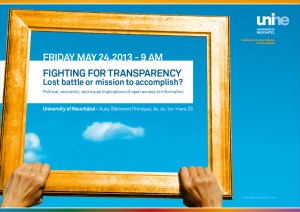
A special thank goes also to Peter Rothenbuehler for his genuine support through a very lively and engaged moderation. Last but not least the AJM thanks Tamedia Publications Romandes, Ringier Romandie, the Radio Télevision Suisse as well as the Faculty of Economics and Business at our University for sponsoring the event.
-
Introduction
Fighting for Transparency
Lost battle or mission to accomplish?
Introduction
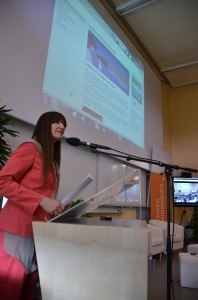 Cinzia Dal Zotto, Professor of Media Management at the University of Neuchâtel
Cinzia Dal Zotto, Professor of Media Management at the University of Neuchâtel Before entering the debate it might be useful to reflect on the meaning of transparency. Transparency can be understood as the reduction of information asymmetry, a condition for which –when conducting transactions – one party has more or better information than the other. The absence of information asymmetry would mean perfect information and therefore absolute transparency, an ideal but quite unrealistic situation. Non-transparency or opacity contributes to the building up of information asymmetry, i.e. to an unbalance of power in transactions which can cause transactions to fail.
Is information asymmetry a new problem?
Not at all. In the ancient Greece open discussions in the “agora” served as measures to reduce information asymmetry, during the age of enlightenment intellectual interchange was promoted in order to act upon abuses of power …
If the problem is not solved yet, is fighting for transparency a lost battle then?
Not at all. Transparency needs to be sought after as it reduces abuses of power. Opacity facilitates the use and eventually the abuse of power. New media technologies are increasing the possibility for normal people to be informed and reduce information asymmetry. However, means to classify and prioritize the increasing amount of available information are necessary for transparency purposes.
What does journalism has to do with all this?
The editing work of journalists is fundamental in order to turn data, observations, and events into classified and therefore easily detectable information. Just to make an example, we know that greater press coverage reduces information asymmetry (lower bid spreads and greater market depth) around earning announcements. Journalism can therefore substantially contribute to enhance information transparency. By serving a much more alert and active public, information media organizations have the chance to regain their watchdog function. They can also choose not to inform the public and contribute to opacity; however, this will not remain unnoticed by the public today.
How can journalism contribute to enhance information transparency?
Journalists can provide signals to allow the public gain a better understanding. Journalists can also screen facts and events in order to induce interested parties to reveal further information. Furthermore, journalists can go deeper and, by conducting research, provide primary in depth information.Conditions for journalists to make this possible are the following: (1) investing in journalism education and continuing education, (2) using and sharing all possible media to source information and transmit the message, (3) collaborating with colleague journalists worldwide to increase resources and better protect themselves.
Does the building up of transparency have limits?
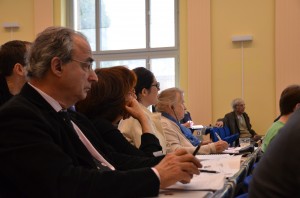 Absolute transparency is not even desirable as it can become an intrusion into personalrights and privacy (see the Associated Press Gate). Privacy protection represents therefore a limit for information transparency. Another limit can be found in legal boundaries set by state authorities.
Absolute transparency is not even desirable as it can become an intrusion into personalrights and privacy (see the Associated Press Gate). Privacy protection represents therefore a limit for information transparency. Another limit can be found in legal boundaries set by state authorities. Fighting for transparency seems therefore to be more a mission to accomplish than a lost battle. The discussion is however open and reflection is needed in order to understand (1) the impact of both information transparency and opacity at social, political and economic level, (2) the role of the different actors involved (governments, media, citizens, individuals), as well as (3) the importance of accessing and using information and communication technologies.
In order to capture these three different aspects of the information transparency debate, the conference organizers invited and had the chance to welcome speakers with different profiles and backgrounds, coming from different countries and representing different professions. Politicians, academics as well as professional journalists gathered and contributed to a genuine and constructive discourse on the topic.
-
Power and transparency in the age of Wikileaks
Power and transparency in the age of Wikileaks
Christian Christensen, Professor of Journalism at the University of Stockholm
 Christensen starts with a critique of the techno-utopian vision according to which technology is the key in the interrelationship between individual action, politics and technology. Technology enables the coordination of information as well as the reconfiguration of public exchange, power systems and social relations constituting a new public sphere. However, according to Christensen there are three digital Myths that need to be dismantled:
Christensen starts with a critique of the techno-utopian vision according to which technology is the key in the interrelationship between individual action, politics and technology. Technology enables the coordination of information as well as the reconfiguration of public exchange, power systems and social relations constituting a new public sphere. However, according to Christensen there are three digital Myths that need to be dismantled: (1) the uniformity of social media: each social media form has different structure, architecture, editorial processes, and therefore different users at the base.
(2) the death of the Nation-State: if large corporations have been gaining power, Wikileaks showed that the nation-state is still a very important actor back to the middle of the scene: laws are the results of nation-states (see laws regarding protection of information sources, whistleblowers etc.) and each state has its own laws.
(3) the death of Journalism: by releasing information via mainstream media Wikileaks further proved that mainstream media still matter: news need to be broken and released by a news organization.
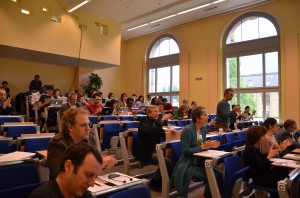 At the heart of the three myths mentioned above there is the presumption of a causal relationship between access to information and democratic change. According to Christensen (2010) “The idea that mere access to raw information de facto leads to change is as romantic as the notion that mere access to technology can do the same. Information is only useful if the knowledge and skills required to activate such information are present”. “WikiLeaks (…) forced us to rethink a number of core democratic relationships: between citizens and the state (impacted by WikiLeaks providing access to sensitive intelligence previously hidden from view); between citizens and the media (impacted by WikiLeaks exposure of the shortcomings of an uncritical commercial media system); and between media and governments (impacted by WikiLeaks challenging the mantle of “watchdog” proudly trumpeted by major mainstream news outlets)”. (Christensen, 2012)
At the heart of the three myths mentioned above there is the presumption of a causal relationship between access to information and democratic change. According to Christensen (2010) “The idea that mere access to raw information de facto leads to change is as romantic as the notion that mere access to technology can do the same. Information is only useful if the knowledge and skills required to activate such information are present”. “WikiLeaks (…) forced us to rethink a number of core democratic relationships: between citizens and the state (impacted by WikiLeaks providing access to sensitive intelligence previously hidden from view); between citizens and the media (impacted by WikiLeaks exposure of the shortcomings of an uncritical commercial media system); and between media and governments (impacted by WikiLeaks challenging the mantle of “watchdog” proudly trumpeted by major mainstream news outlets)”. (Christensen, 2012) -
Information and Information overflow
Information and Information overflow
Reiner Mittelbach, Geopolitical Information Service
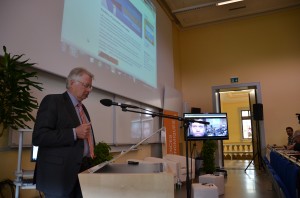
If we look at the impact of citizen journalism, if we look at the opportunities new technologies offered, if we look at twitter, youtube or social media - it has to be stated that the world has become a lot more transparent in the last 20 years. It also has become a lot more complex at the same time. Let me finish with some remarks on what I like to see changed for more transparency and for more reliable information.
Just a pre-warning: there will be some very critical remarks.
- It seems that reporting is out and was replaced by sensationalism already a while ago.
- Witch-hunts have become daily business even in serious publications.
- Publishing stolen data which are declared top secret and information that might put other people lives at risk has nothing to do neither with serious journalism nor with fighting for transparency.
- Publishing stolen information to discredit companies has nothing to do neither with journalism nor with supporting transparency.
- Criminal acts to get hold of information like phone-hacking has nothing to do with serious journalism nor does it add to transparency.
Instead:
- Serious research, background information and an outlook about what is likely to happen next would help foster a position as a trusted source of information.
- A multi-angle view with input from experts will help create transparency. Readers got brain.
- A separation between the report and the opinion piece will help create transparency as well.
- Give up the information monopoly. It does not exist any longer anyway. Collaboration and sharing is a way to success and to more transparency.
- Be prepared that too much transparency in the wrong hands is dangerous.
-
Discussion Panel on political and social aspects
Discussion Panel on political and social aspects
 Birgitta Jonsdottir, Pirate Party Iceland
Birgitta Jonsdottir, Pirate Party Iceland Leaks should be encouraged, if it is in the public interest. No country in the world has a law which protects computer privacy effectively.
Dick Marty, previous member of the Swiss Council of States and of the Parliamentary Assembly of the Council of Europe
He cites Arendt "the truth never appeared among the
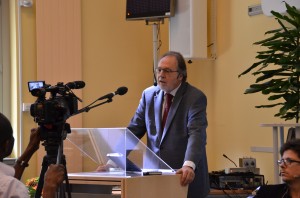 political virtues".Thanks to the publication of the Pentagon Papers, the Vietnam War ended earlier, according to historians. The worst form of lying is to tell half-truths! It is easy to demonstrate the lies and silences of totalitarian States, but what concerns is what is happening in our democracies.
political virtues".Thanks to the publication of the Pentagon Papers, the Vietnam War ended earlier, according to historians. The worst form of lying is to tell half-truths! It is easy to demonstrate the lies and silences of totalitarian States, but what concerns is what is happening in our democracies.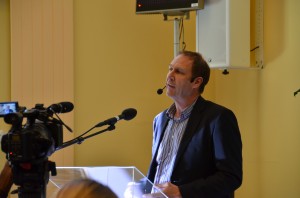 Jean Philippe Ceppi, investigative journalist, producer RTS at “Temps Present
Jean Philippe Ceppi, investigative journalist, producer RTS at “Temps Present Has this wave of transparency facilitated access to information for journalists? Rather not. A new front has been opened, but others are open for the journalism profession. We are forgetting other issues experiencing difficult times: confrontation with launchers of alerts, difficulty to protect them (India and South Africa have laws which can make Swiss journalists envious), and journalism "under cover" (even Albert Londres practiced it; today it is much more difficult. The legislation has become very repressive concerning hidden camera).
Titus Plattner, investigative journalist at SonntagsZeitung/Matin Dimanche and board member of Loitransparence.ch
Presents the platform of loitransparence.ch. LTrans (transparency Act) guarantees access to official documents with the principle that everything which is not secret is public. The public bodies are also affected by the LTrans. Exceptions: information about the Federal Council, information concerning the private sphere, information concerning the secrecy of business (the latter is often used by the administration). Example of information made public: the amount in the AEGIS contract spent to protect the Embassy in Tripoli. Thanks to the LTrans we could further obtain the info that Rolex paid CHF 33 million to put its name on the EPFL Learning Center!
The use of the LTrans allows improvements for future applications: it took 39 months for a journalist to obtain information about the amount of indemnity paid to manager made redundant: this case allowed to make the practice semi-automatic for the future.
-
Discussion with audience
Discussion with audience
Question: didn’t the mountain of Offshore Leaks give birth to a mouse?
Titus Plattner: believes that Sachs has dangerously approached the limit. He is not a tax inspector and therefore cannot decide; however, from a moral point of view, publishing those financial arrangements was of public interest! Arbitrating what to publish or not, it is a journalistic responsibility.
Dick Marti: as a consumer, asks to the media the same transparency asked to the Government.

Jean-Philippe Ceppi: when contacted by wikileaks/offshore leaks, we should question the relevance of documents with a journalistic approach.
Question: Specifically, what is the journalists’ situation regards transparency tools?
Titus Plattner: Very envious of the American Freedom for Information Act. Compared to the Swiss situation, the conditions of that act are extraordinary.
Christian Christensen: Lots of information that is supposed to be accessible is actually not for reasons of "national security". There is also a trend towards hunting of whistleblowers who are threatening power.
Question: Is transparency a victory? The journalist’s function remains decisive. Rights and obligations should be highlighted! If on one hand there is more power (and information), on the other hand there are also more responsibilities.
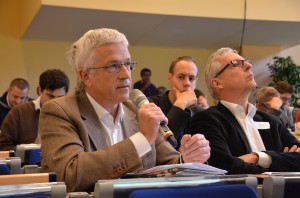
Dick Marty: The multiplication of information channels in fact does not improve the quality of information. The work of journalists is absolutely important.
Jean-Philippe Ceppi: You need to know to use transparency. The American investigation model is not a totally convincing example. It is necessary to find people who are willing to and can make use of the existing transparency.
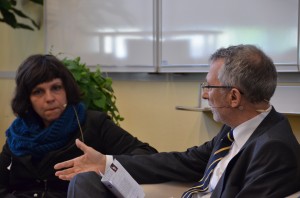 Birgitta Jónsdóttir has a 22-year-old son who never reads newspapers and never watches TV, and he is not less well informed than other people of his age (he uses social networks). The junk of junks is the 'clicks' online media!
Birgitta Jónsdóttir has a 22-year-old son who never reads newspapers and never watches TV, and he is not less well informed than other people of his age (he uses social networks). The junk of junks is the 'clicks' online media! -
Keynote Speach
Keynote Speach
Kristinn Hrafnsson, Wikileaks spokesperson
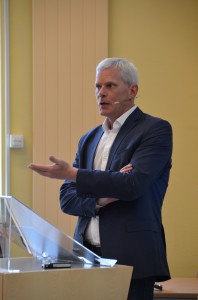 I will attempt to touch upon a few angles that I feel are of interest to those who try to analyze the Wikileaks phenomenon. First, allow me to approach this from an angle I call “evaluating action through reaction” – especially concerning the big US military and diplomatic leaks, starting in 2010. Later I will discuss the actual effects of WikiLeaks and what I perceive as a major contribution to journalism that we could even mark as a watershed.
I will attempt to touch upon a few angles that I feel are of interest to those who try to analyze the Wikileaks phenomenon. First, allow me to approach this from an angle I call “evaluating action through reaction” – especially concerning the big US military and diplomatic leaks, starting in 2010. Later I will discuss the actual effects of WikiLeaks and what I perceive as a major contribution to journalism that we could even mark as a watershed. It was not until the publications of four projects in 2010 that WikiLeaks became known to the world. The release of the Collateral Murder video, the Afghan war diary, the similar reports from Iraq, and finally the release of the 250 000 cables from the US Department of State. The reaction to the revelations was frenzy and overblown. There is an ongoing investigation into alleged breach of law by WikiLeaks in the United States, a desperate attempt to find an angle to indict Wikileaks. We know that more than 30 thousand pages of documents have been collected in this investigations. Australian diplomats … wrote that they deemed the WikiLeaks investigation as fast becoming the biggest criminal investigation in recent history. In my mind this underscores the success of WikiLeaks. In the escalating secrecy of governments, especially after 9/11, WikiLeaks has proved to be the only threat to a serious trend of secrecy.
A second major reaction to be reported is the attack on Wikileaks by the major players in
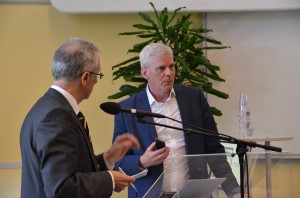 the banking and financial fields. It is important to fight the banking blockade for the sake of other organisations – also media – who could be hit next. Just remember recent attacks on journalism in the US where phone records from AP have been accessed by the authorities, and journalists who are under threat of legal action for doing what they are supposed to do.
the banking and financial fields. It is important to fight the banking blockade for the sake of other organisations – also media – who could be hit next. Just remember recent attacks on journalism in the US where phone records from AP have been accessed by the authorities, and journalists who are under threat of legal action for doing what they are supposed to do.A third reaction came from mainstream media organizations who saw us as a threat to traditional journalism. ….Wikileaks instead contributed to the world of journalism introducing some new models. Publishing in 2010 and 2011 was done in collaboration with more than 100 media establishments around the world. They were partly responsible for redactions and reported back to Wikileaks. Wikileaks published the source material. Media organisations were forced to cooperate by sharing findings. This was a totally new approach to collaboration which we named “connective publishing”: a two-way communication surrounding the analysis of the materiali s at the base of it.
The technical expertise of Wikileaks was combined with the competence of seasoned reporting staff of established media partners such as The Hindu Times in India, and Asahai Shimbun in Japan. Despite normal tensions the fact that information was pushed out into the public arena across numerous languages and geographies on such a large scale proves that the model works and contributions of all participating media players were significant and determinant.
Another innovation brought about by Wikileaks is the “crowd sourced declassification”. The cleaning and declassifying of secret and confidential documents published by Wikileaks was done by a crowd of journalists belonging to many different organisations. For the first time this core function has been “outsourced” to a civilian community without security clearance … The technologies available in 2011 for the crowd sourcing declassification allowed a great amount of material to be made public quickly. Furthermore, information could be put in searchable formats. In this sense the entire structure contributed to crowd sources data journalism.
This innovation is important for three main reasons: (1) they illustrate that governments’ claim that certain information must be kept under lock and key for national security reasons is overstated. It is more an issue of embarassement. (2) The Wikileaks model can be easily and cheaply replicated … a way forward for small online media organisations. (3) It is the first alternative way for government information to be released in public interest, using an arm’s-length method employing non-government citizens to screen the data.
The model removes the internal conflict inside government between the obligation to make as much information available to the public as possible and the desire to cover things up that are embarassing or that reveal wrongdoing.
Last but not least Amnesty International acknowledged Wikileaks role as a catalyst for the Arab Spring. It concludes that 2010 might be remembered as a watershed year when activists and journalists used new technology to speak truth to power, and in so doing had pushed for greater respect for human rights.
-
Discussion Panel on economic aspects
Discussion Panel on economic aspects
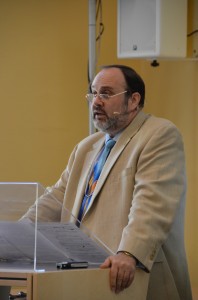 Robert Picard, Director of research at the Reuters Institute, Oxford, Department of politics and international relations
Robert Picard, Director of research at the Reuters Institute, Oxford, Department of politics and international relations The question is not whether we need to have transparency or not, but how!
Jean-Pierre Meant, president of the Swiss section of Transparency International
Starts by introducing Transparency International, present in 100 countries, it represents the Swiss section. Money plays a big role in journalism, and corruption is also a major problem in a very large number of countries.
Jean Marie Etter, director of Foundation Hirondelle, NGO of Swiss journalists and humanitarian aid specialists for supporting independent media in conflict zones
The regions concerned are areas without a powerful State, with a complete opacity of the business world and a lack of governmental administrative sphere.
The media are an issue as they are instruments of influence for auxiliary power. However, they do not represent an economic issue (unlike in developed and stable countries). There cannot be any editorial independence without economic independence; in conflict zones media work at a loss for the Government, therefore independence is not possible.
François Pilet, economic journalist at Le Matin Dimanche

The transparency we are talking about today is the surface effect of a technological revolution. Technology has changed the balance of power. Technical tools have enabled individuals to break the sphere of secrecy. Pilet reviewed the history of the "leaks" concerning Swiss banks.
Wikileaks taught the media how to work together (a mass of information is difficult to manage on your own).
-
Discussion with audience
Discussion with audience
Question: Is there a legitimate secret, as there is a legitimate transparency?
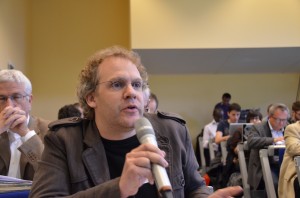
Robert Picard: To be legitimate, a secret must be beneficial to the public. Time decreases the need for secrecy.
François Pilet: Until this technological revolution, the secret was an absolute protection of power (for businesses, for example).
Question: everyone says that institutions (such as FIFA) are corrupt, but nothing happens, what shall we do?
Jean-Pierre Méan: The corruption that takes place during allocation of sporting events
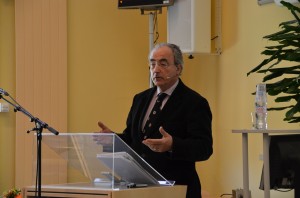 does not fall under Swiss law. Should criminalize the unjust enrichment. When a politician or senior official enters her/his function and her/his fortune increased during the period spent in that function, it should be possible to ask him to account for this increase (if it is greater than his official salary).
does not fall under Swiss law. Should criminalize the unjust enrichment. When a politician or senior official enters her/his function and her/his fortune increased during the period spent in that function, it should be possible to ask him to account for this increase (if it is greater than his official salary). In Liberia, for example, at the microphone, interviews are often very hard between journalists and Ministers. The fact is that, locally, there is a close relationship between political and media culture: It is impossible to move one forward without the other one. If we want to move forward on transparency, it is here, in Switzerland, that we need to start.
Robert Picard: Problem of transparency: who owns the media companies?
Question: What protection for whistleblowers and journalists “sous cape”?
Jean-Pierre Méan: The whistleblowers are entitled to compensation for the damage they suffer when grilling. In Switzerland, one speaks of a few months of wage replacement. In relation to attorney fees, I see no problem why we shouldn’t provide a good defense.
Robert Picard: We are responsible for our own actions. Even if we do it with morality, we transgressed the law if we are a whistleblower or a hidden reporter.
Question: How do I succeed to pass through the filters of communication teams?
François Pilet: Yes, communication is a cloud of smoke organized to make a situation opaque. For one journalist, there are 10 among communication specialists and lawyers within the PR department of a corporation who reflect on his question.
Question: How to ensure that journalists are not corrupted?
Jean Marie Etter: We pay very well our journalists, with the absolute rule of zero tolerance. We have recently dismissed a reporter who accepted money, even if it was a small sum.
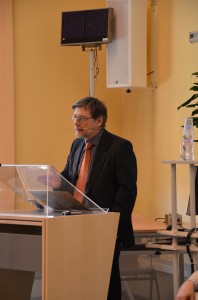 Question: What is the target of transparency?
Question: What is the target of transparency? Jean Marie Etter: Is not by chance that the banks fell, it is because there were political interests. You ask me about the next target? Mining companies, they are incredibly corrupted. But there’s certainly not political interest to target these companies.
It is therefore not up to journalists to choose the next target!
Question: more information is sought on what is happening between the walls of the Geneva Ports-Francs, how to conduct an investigation and require transparency on such a topic?
François Pilet: There were investigations, but the mystery remains pretty much intact. You need to make someone talk. This brings back us to the basics of investigative journalism: you need someone to talk to you, technological revolution or not.
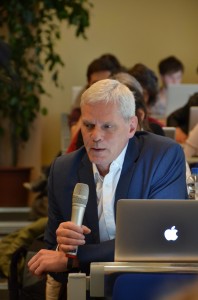
A remarkable conclusion by the spokesperson of Wikileaks, Kristinn Hrafnsson:
Is a good and natural thing that the conference went from a morning about "why transparency?" to an afternoon about "why secrecy?" !
- In the media (English and French)


